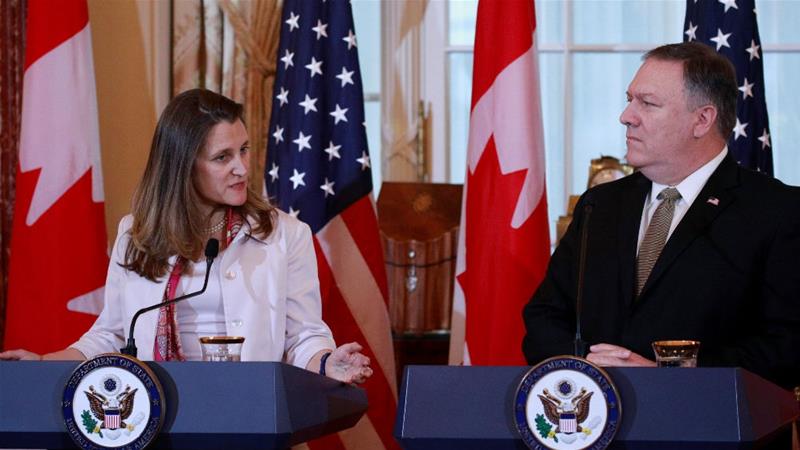The arbitrary detentions of Canadians are not just about Canada -- they represent a way of behaving which is a threat to all countries
AP
 Canada's Foreign Minister Freeland (L) and US Secretary of State Pompeo and at a news conference in Washington in December 2018.
Canada's Foreign Minister Freeland (L) and US Secretary of State Pompeo and at a news conference in Washington in December 2018.
The United States State Department has called the sudden move to award the death sentence to a Canadian man by a Chinese court in a drug trafficking case "politically motivated".
In a statement on Wednesday, deputy spokesperson Robert Palladino said US Secretary of State Mike Pompeo and Canadian Foreign Minister Chrystia Freeland had spoken the previous day and "expressed their concerns about the arbitrary detentions and politically motivated sentencing of Canadian nationals".
The Chinese court has sentenced Robert Schellenberg to death in a sudden retrial in the drug smuggling case on Monday, after giving him a 15-year jail term in 2016.
Freeland and Canadian Prime Minister Justin Trudeau have been talking to world leaders about Schellenberg's case as well as those of two other Canadians arrested in China in retaliation against the December arrest of Meng Wanzhou, chief financial officer of Chinese telecommunications giant Huawei.
Canada had arrested the daughter of Huawei's founder at the request of the US, which wants her extradited to face charges related to the company's business dealings in Iran.
 Canada's Foreign Minister Freeland (L) and US Secretary of State Pompeo and at a news conference in Washington in December 2018.
Canada's Foreign Minister Freeland (L) and US Secretary of State Pompeo and at a news conference in Washington in December 2018.The United States State Department has called the sudden move to award the death sentence to a Canadian man by a Chinese court in a drug trafficking case "politically motivated".
In a statement on Wednesday, deputy spokesperson Robert Palladino said US Secretary of State Mike Pompeo and Canadian Foreign Minister Chrystia Freeland had spoken the previous day and "expressed their concerns about the arbitrary detentions and politically motivated sentencing of Canadian nationals".
The Chinese court has sentenced Robert Schellenberg to death in a sudden retrial in the drug smuggling case on Monday, after giving him a 15-year jail term in 2016.
Freeland and Canadian Prime Minister Justin Trudeau have been talking to world leaders about Schellenberg's case as well as those of two other Canadians arrested in China in retaliation against the December arrest of Meng Wanzhou, chief financial officer of Chinese telecommunications giant Huawei.
Canada had arrested the daughter of Huawei's founder at the request of the US, which wants her extradited to face charges related to the company's business dealings in Iran.
Palladino said Meng's case was also discussed.
"They noted their continued commitment to Canada's conduct of a fair, unbiased, and transparent legal proceeding," the statement said.
"They noted their continued commitment to Canada's conduct of a fair, unbiased, and transparent legal proceeding," the statement said.
China defiant
Canada has embarked on a campaign with allies to win the release of former diplomat Michael Kovrig and entrepreneur Michael Spavor, who were arrested on vague allegations of "engaging in activities that endanger the national security" of China 10 days after Meng's arrest.
"Led by the prime minister, our government has been energetically reaching out to our allies and explaining that the arbitrary detentions of Canadians are not just about Canada -- they represent a way of behaving which is a threat to all countries," Freeland said.
She added that the arrested Canadians would be at the top of her agenda when she visits Davos for the World Economic Forum next week.
Earlier on Wednesday, Chinese Foreign Ministry spokesperson Hua Chunying mocked "actually, you can count by the fingers of your hand the few allies of Canada that chose to side with it on this issue."
Asked about Hua's comments, Freeland said: "I would just point to the fact that the EU alone, which has issued a statement, is a union of 28 countries."
Unlawful arrests
The United Kingdom, Australia and other countries have also issued statements backing Canada.
The White House, meanwhile, called the arrests "unlawful" in a statement after Trudeau called Donald Trump last week, but the US president has not talked directly about the arrested Canadians.
Bruce Heyman, a former US ambassador to Canada, said Washington and other allies need to take a stronger public stance supporting Canada.
"A statement is a statement, but it only has strength in value if there are consequences for behaviour," Heyman told The Associated Press news agency.
"A threat to Canadians is a threat to the United States. That's what's missing here. That's what you do with allies and your best friend. Canada has always been there for the United States in a time of need."
Heyman argued that a lack of leadership from the Trump administration has empowered countries like China and Canada is suffering the consequences.
"We are seeing behaviours around the world by countries who feel that they have a licence to do things because the US is behaving entirely differently," he said.
Heyman argued that a lack of leadership from the Trump administration has empowered countries like China and Canada is suffering the consequences.
"We are seeing behaviours around the world by countries who feel that they have a licence to do things because the US is behaving entirely differently," he said.
"We should be there protecting our allies."